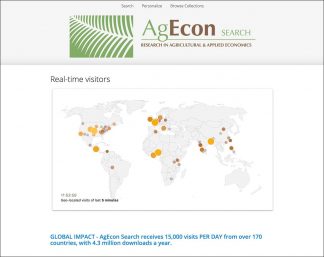By Allison Campbell-Jensen
 A recent map capturing those accessing the AgEcon Search digital library shows users on six continents — but that is a capability only recently added to their website.
A recent map capturing those accessing the AgEcon Search digital library shows users on six continents — but that is a capability only recently added to their website.
Prior to 2005, the global reach of this U of M resource was not clear. But that year, when AgEcon Search Coordinator and Science Librarian Julie Kelly sent out a survey link with their weekly newsletter, people from more than 20 countries responded.
The discovery sent the two coordinators on a trip to Africa and a new focus on the Global South.
Award-winning digital library
AgEcon Search — a partnership between the U of M Libraries and the Department of Applied Economics — was recently recognized with a C. Eugene Allen Award for Innovative International Initiatives from the U’s Global Programs and Strategy Alliance.
“This is an impressive recognition that this digital library wouldn’t be here without the initiative of the Libraries and the partnership with us,” says Frances Homans, Chair of Applied Economics.
AgEcon Search includes 150,000 papers, many from more than 120 small journals around the world, as well as dissertations, working papers, and other full-text research work. Everything is freely available to scholars and, through the librarians, labeled with one or more of the 30 topic areas. Its niche in agricultural and applied economics includes international trade to food security, energy, the environment, finance, development, agribusiness, farm management, and more.
The AgEcon Search has helped Homans appreciate the professionalism of librarians.
“There’s scholarship surrounding libraries and vision around establishing something like this,” Homans says. “You can find information; it speaks to the value and vision of library science. You need to have a vision and a purpose.” Co-coordinator Linda Eells is the department’s librarian.
Turning to the Global South
The team had been attending national agricultural or applied economic conferences. Yet, after receiving the 2005 survey results, Kelly says that a member of the faculty encouraged her and her colleague to attend an international agricultural economics conference in Durban, South Africa. Their applications for a travel grant noted “we would try to talk with 80 economists during this four-day conference,” she says. “We talked with 80 economists by the end of lunch the first day.”
In this experience and those following in the Global South, the point was not just to promote existing resources on AgEcon Search but also to recruit economists from developing areas to share their work.
“It’s so difficult to get your research published if you’re not an English speaker from the North,” Kelly says. “We made it our business to recruit as much material as we could.” They have succeeded in increasing exposure for research relating to and from the Global South, according to their award citation.
Roots in the region
Working papers, reviewed by colleagues, are one way that economists communicate with each other. In an earlier era, Kelly says, they would bring an extra suitcase to a conference to carry their working papers there and others’ papers back. In about 1995, Kelly says, “librarians who started the program decided to gather materials for our own users.”
From that early base serving Minnesota and surrounding states, the AgEcon Search now receives 15,000 visits per day from over 170 countries, with 4.3 million downloads a year. For a niche subject library, that’s quite a global impact.



